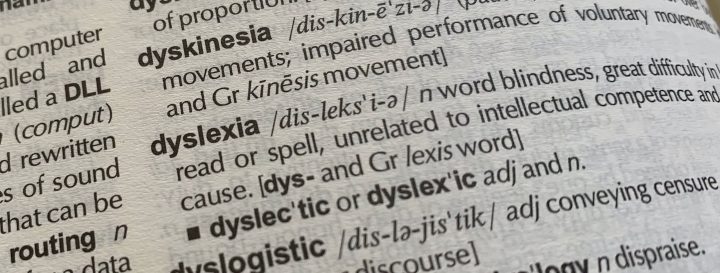REFLECTION
Dyslexia: How I won my battle to pin down the written word

I enjoy the permutations of the written word, and when set in a particular order with creativity and insight it has the ability to teach, to inspire and to share ideas. Here is my story about the written word and how I nearly lost out to its power.
I had no idea I was “disleksik” until someone pointed it out to me around the time I was 23 years old – I had this learning disorder verified later by a specialist. I never knew such a condition existed, let alone its accompanying linguistic expression of a learning disability – dyslexia. A word that for dyslexics is quite clearly near impossible to spell and remembering it is a cruel irony.
Dyslexia has been and continues to be an interesting challenge to me – both with the written word and speech; at its very worst I cannot recall everyday usage words, such as door, shelf or spice rack (the words just disappear in front of me like soap bubbles popping on a hot day). Is it limited to the kitchen? No, I could find myself in the hardware store and for the life of me, cannot recall the word for a common tool. On those particularly confusing days of communicating with the world, top becomes bottom, left becomes right and for whatever reason, foot becomes head! I will watch the incorrect word slowly leave my mouth destined for the ears of a confused listener (I, of course, am egging it on to PLEASE pop like a soap bubble on a hot day – it never does.)
My mother tongue was Italian. I was fluent in the language, babbling away like an Italian used car salesman before I went to school. No one picked up that I learned Italian from my mother and immediate family, through listening and repeating – I did not learn it by reading. English in school was taught via listening (aced that) but also by reading and writing (Houston, we have a problem…)
So, how did I get through school without reading? Thankfully, my early exposure to education at that time revealed that most reading books were accompanied by corresponding pictures. I can still remember the pictures of the first book I was given to read (the famous Dick and Jane series with Spot the dog and white picket fences). Even now, I can still recall the pictures but I draw a complete blank on recalling the corresponding words. So, pictures with a few words scattered in the story was how I got by.
This was a faultless system until I got to high school, where you were expected to know how to read effectively. My first visit to the library was memorable on two accounts.
First, I had never stepped into a library or any other hallowed hall of learning and second, I was tasked by the librarian to read a book by the end of the week and furthermore to complete a book review that was now being despatched by the poor souls sitting in the front row.
“No problem”, I said to myself, eyeing the vast collection of Tintin and Asterix comics. My reverie was rudely interrupted by a loud thud as a book landed heavily on the scarred oak table.
“Here’s your book,” interjected poor soul number two as he continued thudding books on to tables and weaving his way past outstretched legs and school bags as he made his treacherous journey down the aisle. The noisy book was disparagingly placed next to my soggy peanut butter sandwich inside my school bag and soon forgotten.
Once home, I felt I should tackle the library assignment, lest intergalactic violence befell me – the librarian clearly was an alien masquerading as a school teacher, as will be later explained by Agent J in the Men in Black movie franchise. A cursory look at the hardcover novel showed no pictures to indicate the story and plot development. This was disappointing. I carried on with the ordeal regardless.
Question one of the book review asked: “What is the name of the novel?” A quick look at the front cover disclosed the answer. “The Adventures of Tom Sawyer,” I answered on the question sheet.
Question number two: “Who is the author of this novel?” “Mmmm, that must be the person who wrote it,” I said, now clearly impressed with my command of this assignment. “Mark Twain,” I wrote.
My sense of early trepidation was now a distant memory as I breezed through the questions without reading the book. Questions arose as to the style of the author, my answer now gleaned by looking at the font – Clearly, he printed it. A further question asked about the depth of the novel – 274 pages (answered by looking at the last page). The final question asked what I had learned about the main character of the book – “Tom liked painting fences”, and on the strength of the only picture (on the dust jacket), I hastily wrote this down and darted off to soccer practice.
I handed in my assignment with a certain amount of pride, only to be trooped down to the principal’s office after the librarian had read my book report. Four strokes of the cane and a scolding about being the worst pupil in the school were the commencement of my secondary education. I left two years later without ever finishing school.
That year of discovering that I was dyslexic, I found myself in London. So, with purposeful aplomb, I boarded several of London’s red buses to get me to a Dyslexia Association (none existed in South Africa at that time), whose address I had found in the local Yellow Pages. Upon arriving there, the team of office workers were about as helpful as reading a dictionary outdoors on a windy day – a small-print brochure with no pictures was handed over to my disappointed hand. I knew then that I had to solve this on my own. I later came to realise that if I learned the phonetics of the word, I could remember it for usage and perhaps even spell it. And so began my obsession to conquer it. I started by reading the dictionary and sounding out all the words and pronunciations. Through this exercise, I developed a memory of many words, which helps me to this day with spelling.
Several years after I had started that spelling exercise, I discovered by chance that if I wrote down my own personal garbled nonsense on paper, I could somehow recall words without them popping away in front of me as I tried to make sense to whoever was listening. Left stayed left and right did not change over. Top was up there and bottom was where the feet usually were.
I continue to write and read every day in order to keep my dyslexia at bay and to learn by standing on the shoulders of giants.
If I don’t then… uM rite bak at bean disleksik. DM/ML
Steve Bazzea is a jiu-jitsu and mixed martial arts coach at SBG Cape Town. The dichotomy of the warrior and the poet will probably explain why you’ll find him on a jiu-jitsu mat or perusing books at a bookstore. This article was republished after appearing on his personal page.
[hearken id=”daily-maverick/9543″]















 Become an Insider
Become an Insider
Thank you. I teach, and many of my students experience the same. And my youngest is dyslexic. Anecdotes like yours are exceptionally helpful to remind those of us, who learned to read like a duck taking to water, to be patient and understanding. I think that creates space for the person’s brain to seek alternate neural pathways. A shared joy I experience are the audible books that I “read” with my child at bed time. Go well.
Thank you, Steve; you are an inspiration.
Thank you Steve. As a fellow dyslexic, I too have learnt to overcome the barriers to reading and read voraciously.
However, I have never caught or hit a ball of any sort in my life… I reach left and they fly right….